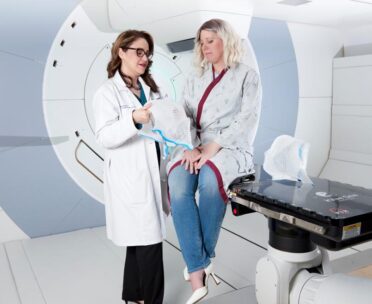
RadComp: Radiotherapy Comparative Effectiveness
- Clinical Transformation
RadComp is comparing the effectiveness of Photon therapy versus Proton therapy for treating patients with breast cancer. Enrolling over 1200 patients at over 50 radiation therapy sites nationwide, this project aims to better understand the optimal treatment for breast cancer treatment to improve health outcomes and overall survival.
Nearly 3 million women are living with breast cancer in the United States. Radiotherapy plays a major curative role in the treatment of breast cancers. Because of incidental radiation to the heart, radiotherapy carries increased risks of cardiovascular morbidity and mortality; survivors who receive radiotherapy have at least a two-fold increased risk of cardiovascular death. Thus, success of cancer therapy has led to survivorship burden. Patients live longer but suffer from toxic consequences of treatment.
Photon therapy and proton therapy are two types of FDA-approved radiation therapies for the treatment of breast cancer. Both treatments give similar doses of radiation to the chest or breast and the surrounding areas. Because there may be radiation to parts of the heart during therapy, patients may have an increased risk of future heart problems. Although proton therapy exposes less of the heart to radiation, it is unknown if the treatment may cause fewer heart problems compared with photon therapy. It is unknown if one type of radiation treatment is better, about the same, or worse in terms of side effects, cure rates, length of life or quality of life after treatment.
The RadComp Study, short for Radiotherapy Comparative Effectiveness, is a pragmatic randomized clinical study comparing photon therapy vs. proton therapy for the treatment of breast cancer. The study enrolled 1,239 patients over 8 years at over 50 radiation therapy practice sites nationwide. Patients were randomly assigned to receive either photon therapy or proton therapy and will be followed for at least 10 years. This study hopes to create a better understanding of the best available technologies for breast cancer to help patients live a longer, healthier life. RadComp employs innovative approaches to enhance real world data and evidence and behavioral economics-informed strategies to accelerate enrollment, retention, and compliance.
RadComp was designed to take place in “real-world” clinical practice and will evaluate important outcomes such as the impact of treatment on patient-reported quality of life, cancer control and long-term heart health.
Patient-Centered Outcomes Research Institute; The National Cancer Institute; The David and Leslie Clarke Outcomes Research Fund; The Alan and Louise Reed Cancer Outcomes Research Fund at the Raymond and Ruther Perelman School of Medicine of the University of Pennsylvania
Radiation Therapy Oncology Group Foundation; Washington University in St. Louis; The National Cancer Institute; Over 50 enrolling proton therapy and photon therapy centers nationwide; RadComp Advocacy Partners
Patient-Powered Proton Study Looks at Long-Term Side Effects
Penn Medicine Magazine Spring/Summer 2024
May 29, 2024


For breast cancer patients, Penn researchers are comparing costly proton therapy with standard radiation
Philadelphia Inquirer
February 1, 2023

Project Leads
-

-

-

Susan Ellenberg
PhD
Emeritus Professor CE of Biostatistics and Epidemiology, University of Pennsylvania
-

Hien Lu
RadComp Project Manager, Department of Radiation Oncology at the University of Pennsylvania
Project Team
-
Amy Berrington
-
Walter Bosch
-
Oren Cahlon
-
Cynthia Chauhan
-
Amanda Driscoll
-
Ashley Feriozzi
-
Zachary Gething
-
Elizabeth Hahn
-
Carolyn Hencek
-
Shannon MacDonald
-
Daniel Mullins
-
Mark Pankuch
-
Stephanie Pugh
-
Nicholas Remmes
-
Sara Tabakha

